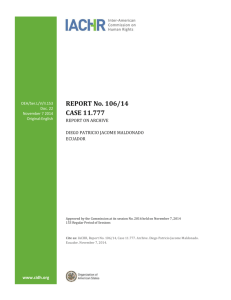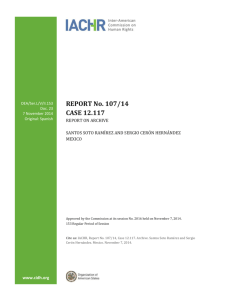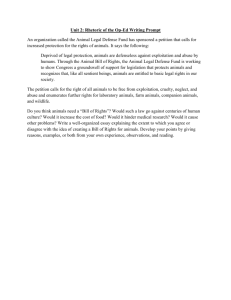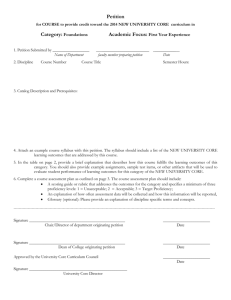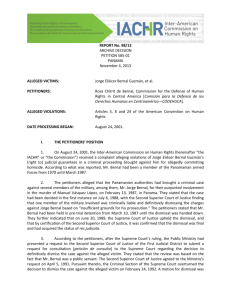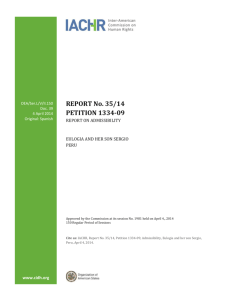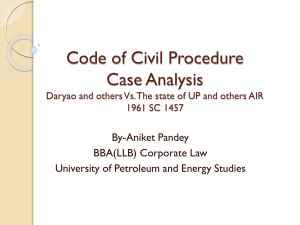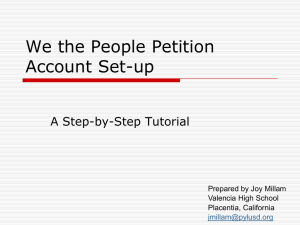Report No. 33/15 - Organization of American States
advertisement
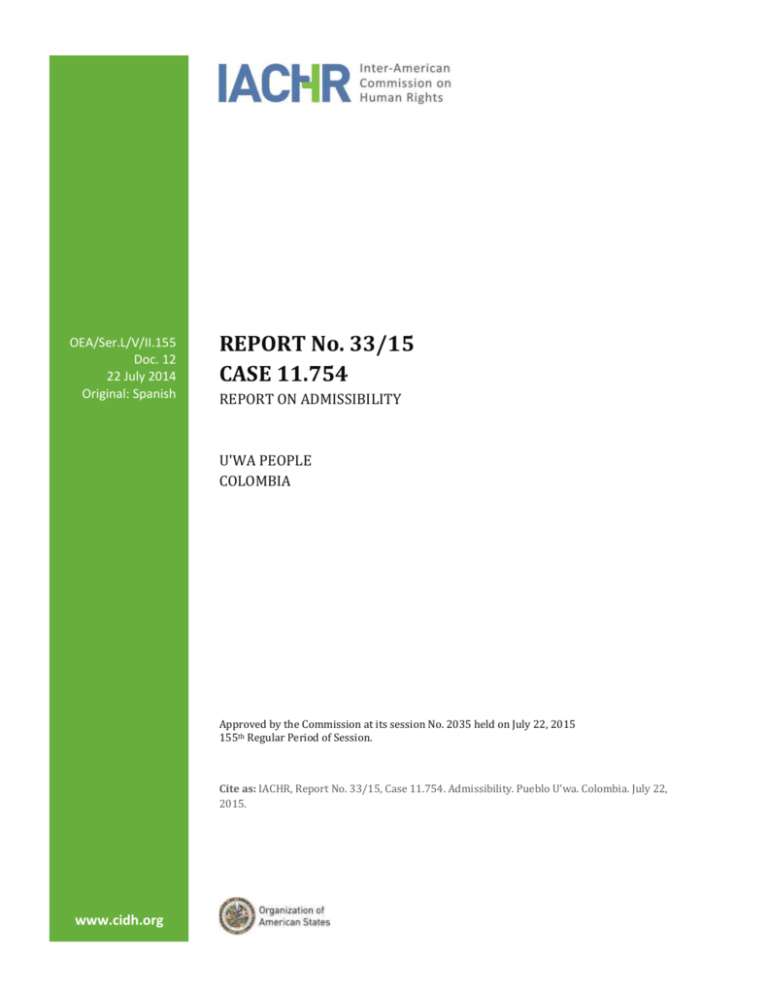
OEA/Ser.L/V/II.155 Doc. 12 22 July 2014 Original: Spanish REPORT No. 33/15 CASE 11.754 REPORT ON ADMISSIBILITY U'WA PEOPLE COLOMBIA Approved by the Commission at its session No. 2035 held on July 22, 2015 155th Regular Period of Session. Cite as: IACHR, Report No. 33/15, Case 11.754. Admissibility. Pueblo U’wa. Colombia. July 22, 2015. www.cidh.org REPORT No. 33/15 CASE 11.754 ADMISSIBILITY U'WA PEOPLE COLOMBIA JULY 22, 2015 I. SUMMARY 1. On April 28, 1997, the Inter-American Commission on Human Rights (hereinafter the “InterAmerican Commission”, “Commission” or “IACHR) received a petition that the U’wa people and its members (hereinafter the “alleged victims”), represented by the the U’wa People’s Asociación de Cabildos Mayores; the Organización Nacional Indígena de Colombia and the Coalition for Amazonian Peoples and Environment (hereinafter the “petitioners”), brought against the Republic of Colombia (hereinafter “the State” or “Colombia”). By note of April 13, 1998, it was reported that the Colombian Commission of Jurists and the Corporación Colectivo de Abogados “José Alvear Restrepo” had joined as co-petitioners. 2. The petitioners allege that without regard for their right to prior, free and informed consultation, the Colombian State has taken measures that directly compromise their physical and cultural integrity and identity. They further allege that the State has failed to take the necessary steps to protect their ancestral territory. Specifically, the original petition was filed in connection with the State’s 1992 approval of an oil exploration project in the so–called Samoré block within the U’wa’s ancestral territory, which the petitioners contend was done without any prior consultations. The petitioners maintain that without regard for the U’wa people’s rights, the State continued to allow drilling, mining and other projects that were prejudicial to the U’wa people’s physical and cultural integrity and identity. As for the exhaustion of domestic remedies, the petitioners maintain that a constitutional writ of protection of human rights [acción de tutela] and an appeal were filed seeking nullification of the government order by which an environmental license was granted for an oil project on the Samoré block, remedies that did not prosper and thus were ineffective in protecting their rights. The petitioners contend that the State is responsible for violation of Articles 1(1) (general obligations), 24 (equal protection) and 25 (judicial protection) of the American Convention on Human Rights (hereinafter the “American Convention”), and Article XIII of the American Declaration of the Rights and Duties of Man (hereinafter the “American Declaration”). 3. The State, for its part, maintains that while the project’s environmental license was approved in 1992 thanks to a concerted effort on the part of national agencies and even international organizations and institutions, all steps and mechanisms available to it were used to ensure that the U’wa people’s rights were effectively protected. It reports that it specifically pursued a process of prior consultations in connection with the oil exploration activities within U’wa territory and that the initiatives undertaken were done in full compliance with the requirements under the domestic legal system, while respecting the U’wa people’s integrity. The State therefore requests that the petition be declared inadmissible since it considers that the claims being made do not tend to establish violations of the American Convention. 4. Without prejudging the merits of the matter, after examining the parties’ positions and in keeping with the requirements stipulated in Articles 46 and 47 of the American Convention, the Commission decides to declare the petition admissible with respect to the alleged violation of the rights protected under Articles 8, 13, 21, 23, 24, 25 and 26 of the American Convention, read in conjunction with Articles 1(1) and 2 thereof, and Article XIII of the American Declaration, to the detriment of the alleged victims. The Commission further decides to notify the parties of this decision and include it in its Annual Report to the General Assembly of the Organization of American States. II. PROCESSING WITH THE COMMISSION 5. The Inter-American Commission received the petition on April 28, 1997, and recorded it as number 11,754. By note of May 27, 1997, the IACHR forwarded the pertinent parts of the petition to the 1 State, and asked that its response be presented within 90 days. By note of July 22, 1997, received on August 7, 1997, the Colombian State presented its initial response to the petition. 6. While the petition was being processed with the Commission, the petitioners filed additional observations on October 24 and 28, 1997, April 3 and 7, 1998, and September 8, 1998. The State presented additional information on January 28, 1998 and June 4, 1998. These briefs were duly forwarded to the respective parties. On October 7, 1997, during the IACHR’s 97th session, a hearing was held with the parties in attendance. 7. By a note of March 3, 1998, the Inter-American Commission placed itself at the disposal of the parties with a view to reaching a friendly settlement of the matter. In a note received on April 3, 1998, the petitioners expressed their willingness to “arrive at solutions of this type provided those solutions will protect and preserve the integrity of our peoples’ rights.” In a note dated June 4, 1998, the State agreed to embark upon a friendly settlement process and, for the first round, suggested meetings with the petitioners to determine what forms of dialogue would be acceptable to both parties. 8. In their reply of August 31, 1998, received the following September 8, the petitioners repeated their willingness to engage in the dialogue, but observed that the government’s stated interest in the process did not jibe with the measures it had taken at the national level. The parties did not present any additional information until February 21, 2007, when a communication was received from the petitioners expressing their interest in reactivating their case with the IACHR, arguing that the situation of the U’wa people had deteriorated and that no progress had been made toward a friendly settlement of the matter. 9. Subsequently, the petitioners provided additional information on February 21, 2007 and December 11, 2013. The State, for its part, presented additional observations on March 1, 2007, June 4, 2007 and October 15, 2014. These briefs were duly forwarded to the parties. Precautionary measures 10. At the time the petition was filed, a request seeking precautionary measures was also submitted in which it was alleged that the “oil exploration would inflict irreparable harm and seriously compromise the U’wa people’s ethnic and cultural integrity and identity.” The petitioners therefore asked the Commission to order suspension of the environmental license granted to the oil company until the Commission determined whether the oil exploration authorized in the Samoré block violates the U’wa people’s ethnic and cultural integrity and identity. By note of May 27, 1997, the IACHR requested information from the State concerning the measures taken to protect the U’wa people’s cultural, religious, social and economic integrity in the context of the oil exploration project. That request was reiterated on July 16, 1997, and answered by the State on August 3, 1997. 11. Furthermore, on February 11, 2000, the petitioners filed another request seeking precautionary measures alleging that the Colombian State had authorized oil drilling at a well called Gibraltar, located hundreds of kilometers from the U’wa reservation, with the result that the oil company had started construction of a road that would be harmful of the U’wa’s ancestral territory. The IACHR did not grant those requests. III. THE PARTIES’ POSITIONS A. The petitioners 12. The petitioners state that the U’wa people live in the Sierra Nevada del Cocuy in the northeastern quadrant of Colombia, in an area spanning the departments of Santander, Norte de Santander, Boyacá, Arauca and Casanare. They further observe that this indigenous people, numbering some 7,000, is one of Colombia’s most traditional peoples and keeps its traditional culture alive based on the practice of orality. They assert that “the way of life and cultural principles of the U’wa people center around respect for the land and the strengthening of U’wa values.” They allege that the Colombian State has, however, adopted a 2 number of measures that directly affect the U’wa people’s physical and cultural integrity and identity and their ancestral lands and territories, without observing that people’s right to prior consultation and without taking the necessary measures to protect their personal, cultural, economic and environmental integrity. 13. They specifically point out that in 1992, under the terms of a partnership agreement signed with the Empresa Colombiana de Petróleos (Ecopetrol), the Sociedad Occidental de Colombia, a subsidiary of the U.S. multinational Occidental Petroleum, started the necessary procedures with the National Institute of Renewable Natural Resources and the Environment (Inderena) to obtain an environmental license for seismic oil exploration in the Samoré block, within U’wa ancestral territory. They contend that Inderena deemed the application to be viable, even though it excluded “the Tamá and El Cocuy national nature parks”. The petitioners state that the Ministry of the Environment also classified the project as viable, but “underscored the matter of community and citizen participation and particularly the question of the U’wa ethnic group that lives within the project’s impact area and location.” They report that in response, a meeting was held with State authorities on January 10 and 11, 1995, where representatives of the U’wa people voiced their opposition to the project and both parties agreed to consider and study the necessary changes. The petitioners state, however, that to their surprise, the Ministry of the Environment regarded those meetings as “prior consultation” and issued Resolution No. 110 on February 3, 1995, by which it granted the requested license. 14. The petitioners state further that on August 29, 1995, the Ombudsperson, serving as representative of the U’wa people, filed a petition seeking a constitutional writ of protection of human rights [acción de tutela] and an appeal seeking nullification of Resolution 110. The petition for a constitutional writ of protection was filed with the Superior Court of Santafé de Bogotá and asked the court to issue an order that the resolution be declared unenforceable, that a consultation process be undertaken and that measures be ordered to effectively protect the rights of the U’wa people. In a decision of September 12, 1995, the Court granted provisional relief and held that “insofar as it concerns the territories occupied by the U’wa people, resolution 110 […] is unenforceable until such time as a proper and legal process of consultation with that community is conducted.” The petitioners report that on October 19, 1995, the Supreme Court overturned that decision; however, in a February 3, 1997 ruling on review, the Constitutional Court revoked the Supreme Court’s ruling and upheld the decision of the Superior Court of Santafé de Bogotá. The petitioners underscore the fact that the Constitutional Court affirmed that “the process followed for issuance of the environmental license was irregular” and ordered that “steps be taken within 30 working days […] to conduct the consultation with the U’wa community.” As for resolution 110, the Court held that “it will remain in effect until such time as the administrative law court rules on the question of [its] validity.” 15. As for the second remedy filed, the petitioners state that on August 29, 1995, the Ombudsperson petitioned the Council of State seeking temporary suspension and complete nullification of resolution 110. They report that by a decision of September 14, 1995, the First Section of the Administrative Law Chamber declined the petition seeking temporary suspension of the resolution being challenged. They further report that on March 4, 1997, the Council of State rejected the claims being made and lifted the Constitutional Court’s order declaring the resolution unenforceable. The Administrative Law Chamber found that “the consultation conducted was not irregular and did not disregard the right to a hearing and a defense.” The petitioners contend that with this decision, internal remedies were exhausted. 16. They point out that at the State’s request, representatives from the Organization of American States (OAS) and Harvard University conducted a study that produced a series of recommendations made to the Colombian State. The petitioners contend, however, that these recommendations were never fully carried out. They report that, on the contrary, thereafter the State continued to take measures without consulting the U’wa people beforehand, thereby violating their right to prior consultation. The petitioners make particular reference to oil exploration and drilling activities said to have occurred at Gibraltar wells 1, 2 and 3, on Line 2D of the Sarare Seismic Program and in the Catleya block, activities that were damaging to the territory of the U’wa People. They also mention the approval of other projects about which the U’wa people were reportedly not consulted, such as the Gibraltar-Bucaramanga gas pipeline; a binational highway that was part of the project for Integration of the South American Regional Infrastructure (IIRSA); a series of mining rights and applications; and the creation of protected natural areas like the “Parque Nacional Natural El Cocuy” 3 which the petitioners claim would overlap nearly 92 thousand hectares of the U’wa Unified Reservation. They also point out that Decree 1320, issued [July 13, 1998] to regulate the matter of prior consultation, was done “without any prior consultation, in flagrant violation of ILO Convention 169 and in violation of the indigenous peoples’ constitutional rights.” 17. They also report that they applied to INCORA (Instituto Colombiano de la Reforma Agraria) [Colombian Institute of Agrarian Reform] for creation of a “single reservation,” which was legally established under Resolution 56 of August 6, 1999. However, they contend that the expansion was not configured to conform to the U’wa people’s requests, which were based on their ancestral territory; instead, the “single reservation” was configured to suit oil exploration interests, allowing oil drilling activity within meters of the indigenous communities. They add that 14 years after approval of the resolution, the State has still not fully secured the U’wa territory against third party acts and claims and not yet handed over all titles to the U’wa people. 18. Here the petitioners make general reference to acts of violence allegedly committed against members of the U’wa people and for which no one was ever made to answer. They make specific mention of the “death of 3 United States citizens who were activists in the cause of indigenous peoples’ rights (Terence Freitas, Ingrid Washinawatock, Lahe'ena'e Gay, 1999); the death of two U’wa children on February 11, 2000; the death of Siwakubo Bocota and Rukuiso Bocata, two indigenous persons killed by military forces in Saravena, Arauca, on January 5, 2004; injuries sustained by Alexis Celis Valencia on October 24, 2005, inflicted by military forces guarding the oil infrastructure, among others.” They also state that, using “violence” and “without due process”, on January 25 and 27, 2000 anti-riot police conducted evictions in the area where the Gibraltar 1 well was being drilled. They maintain that on January 27, 2000, at a place known as “Las Canoas crossing […] one Kenowia Bócota child (age 4) and one Sikuani child drowned.” 19. Based on the foregoing, the petitioners are alleging violation of the U’wa people’s right to ethnic and cultural integrity, their right to participation and consultation, and their right to an adequate and effective recourse. They contend that the facts denounced constitute a violation of Articles 1(1), 24 and 25 of the American Convention and Article XIII of the American Declaration. They further argue that based on Article 29 of the American Convention, the latter should be interpreted taking into account the International Covenant on Civil and Political Rights and ILO Convention 169 Concerning Indigenous and Tribunal Peoples in Independent Countries, both of which Colombia has ratified, as well as any Colombian laws containing provisions that protect indigenous peoples’ rights as recognized in the Constitution and Law 99 of 1993. B. The State 20. Concerning the facts denounced, the State points out that under the terms of a contract with Ecopetrol, in 1992 Occidental of Colombia filed an application with Inderena seeking to obtain an environmental license in order to proceed with seismic explorations in the Samoré block. It reports that this petroleum block included the municipalities of Saravena, Tame and Fortul in the department of Arauca; the municipality of Cubará in the department of Boyacá and the municipality of Toledo in the department of Norte de Santander. It states that “some of the U’wa people’s ancestral territories were inside the perimeter of this petroleum block.” It argues that a number of studies were conducted that served as the basis for the technical findings that corroborated the project’s viability. Like the petitioners, the State points out that on January 10 and 11, 1995, representatives of the Administration, the Ministries of Mines and Energy and of the Environment, ECOPETROL and Occidental Corporation met with 40 members of the U’wa people. It points out that the Ministry of the Environment “assumed that the meetings in question constituted measures taken to comply with the prior consultation requirement” and proceeded to issue Resolution No. 110 of February 3, 1996, granting the environmental license. 21. The State also makes reference to the petition seeking a constitutional writ of protection of human rights [acción de tutela] and the appeal for nullification, which the Ombudsperson filed on August 29, 1995 in representation of the U’wa people. The State’s description of both proceedings is similar to that of the petitioners. It points out that on the petition for a constitutional writ of protection of human rights [acción de tutela], the Constitutional Court decided to order temporary protection of the U’wa people’s rights 4 and ordered the State to conduct the prior consultation. It adds that the Constitutional Court, however, made enforcement of its decision conditional upon the ruling from the Council of State, which was issued on March 4, 1997 and denied the plaintiffs’ claims. It thus contends that “the issue in dispute is that in the Indigenous Community’s view, the consultation was not done in the manner prescribed by law”, a matter that the State contends was decided by the Council of State, the appropriate forum in the Colombian legal system. 22. At the same time, it states that “it is mindful of the U’wa people’s interest in defending their cultural integrity” and that it therefore “continue[d] fostering the measures necessary to ensure effective protection of their constitutional rights.” Specifically, it points out that it called upon the OAS General Secretariat to enlist experts from Harvard University to conduct an on-site investigation leading to the establishment of a method of dialogue and a model of behavior and management for projects conducted in areas in which indigenous communities lived. It reports that between May and August 1997, members of Harvard University’s Center for International Affairs and the OAS Unit for the Promotion of Democracy conducted visits, field work and interviews with members of the U’wa people, representatives of the oil companies and state officials. It reports that in November 1997, the findings of the investigation were presented, which contained a recommendation to the Colombian State for adoption of a series of measures. 23. The State asserts that a number of steps were taken toward effective implementation of the recommended measures. Among these, it highlights the process it developed for prior consultations with the U’wa people’s traditional authorities, which was based on a concerted methodology aimed at protecting the U’wa people’s fundamental rights. It points out that because of the U’wa people’s organizational structure, the process was conducted both with ASCATIDAR, an organization representing the U’wa of the department of Arauca, and with ASOU’WA, which represents the U’wa people in the departments of Boyacá, Santander and Norte de Santander. It describes various stages of the process and emphasizes that the Office of the Attorney General of the Nation and the Office of the Ombudsperson were involved in monitoring the process. It points out that the process began in 2004 and ended in 2006 with ASCATIDAR’s disavowal of the project and ASOU’WA’s repeated refusal to participate in it. The State contends that given this situation, the Ministry of the Interior and Justice consulted the Council of State about the legality of the consultation, in order to be able to get the project started. It reports that on February 2, 2006, the Council of State held that the consultation was legal, reasoning that “commencement of work on the petroleum project is not legally precluded by the absence of an agreement between the Government and the affected communities or the latter’s unwarranted reluctance to participate in the prior consultation process.” 24. The State argues that the petroleum project at issue in the prior consultation process has been the same since its start in 1992, when the oil company applied for the environmental license. It explains that in 2002, ECOPETROL redesigned the Samoré block to form the Sirirí and Catleya blocks “for purposes of exploration prospectivity.” The State therefore argues that the process of prior consultation between the State and the U’wa people has been the same since the start, even though its execution has been separated by stages. It further contends that the controversy has been the same from the outset, and centers around the prior consultation process and the U’wa people’s participation in the decision on the oil project. In short, it argues that “thanks to a concerted effort on the part of national agencies and even international organizations and institutions all steps and mechanisms available to [the State] were used” with a view to resolving the case in question. It is therefore requesting that the petition be declared inadmissible since the claims made by the petitioners concerning the absence of an adequate prior consultation process do not tend to establish violations of the human rights protected under the American Convention. 25. It further maintains that the petitioners’ observations regarding the alleged existence of irregular drilling rights and applications for oil exploration within U’wa territory do not tend to establish violations of the American Convention, since the State contends that the rights that the petitioners are referencing were granted in accordance with the legal requirements; they have either been cancelled or the necessary measures have been taken to establish whether indigenous communities are affected and, if so, to conduct a prior consultation process before commencing the exploration and drilling activities. Further the State contends that construction of the Gibraltar-Bucaramanga gas pipeline was done in full compliance with the legal requirements, while respecting the U’wa people’s integrity; the competent authorities have addressed any complaints that the community has brought. 5 26. Concerning the alleged failure to comply with its obligations regarding recognition and protection of the U’wa territory, the State argues that the demarcation of the U’wa Unified Reservation “was the result of an agreement signed by the Ministry of the Environment and the representatives of the U’wa Indigenous Communities on July 19, 1999.” The State recounts the measures that INCODER took between 2005 and 2013 in the process of securing the indigenous territory against third-party acts and claims, expanding it and granting title to it. The State argues that thanks to these measures, the majority of the territory has been regularized and progress has been made toward the acquisition of 365 land parcels involving a surface area of 15,133,1062 hectares and 136 improvements. The State argues that the fact that the Cocuy National Park overlaps the U’wa’s ancestral territory is not a violation of domestic law and does not affect the integrity of the U’wa territory, since “a special regime to benefit the indigenous community” is established. Based on the foregoing, the State requests that the claims made regarding the recognition and protection of the U’wa territory be declared inadmissible because they do not tend to establish violations of human rights. 27. The State further contends that the alleged acts of violence and impunity have “no causal nexus to the original facts set forth in the petition under consideration in this matter and therefore should not be added to the petition under study.” It adds that according to information supplied by the National Prosecution Service, the motives are unrelated to the Project. As for the alleged evictions, said to have occurred in January and February of 2000 and to have caused the deaths of three indigenous children, the State points out that the National Human Rights Unit of the National Prosecution Service conducted a preliminary inquiry, classified as No. 733. It reports that the investigation found that two of the children alleged to have been killed were actually alive and the third child’s death was accidental. The State indicates that the Prosecution Service observed that there was no evidence of any police mistreatment of members of the indigenous community. Accordingly, the State asks that these claims be dismissed, since they were duly taken up and substantiated by competent and independent authorities observing due process. The State contends that the petitioners would have the IACHR act as a court of fourth instance. IV. ANALYSIS OF ADMISSIBILITY A. The Commission’s competence ratione personae, ratione loci, ratione temporis and ratione materiae 28. The petitioners are, in principle, authorized by Article 44 of the American Convention to submit petitions to the Commission. The alleged victims named in the petition are the U’wa indigenous people and its members,1 whose rights under the American Convention the State pledged to respect and protect.2 As regards the State, the Commission points out that Colombia has been a State party to the American Convention since July 31, 1973, the date on which it deposited its instrument of ratification. Therefore, the Commission has competence ratio personae to review the petition. 29. The Commission also has competence ratione loci to review the petition as it alleges violations of rights protected under the American Convention and said to have occurred within the territory of Colombia, a State party to that convention. The Commission also has competence ratione temporis as the 1 See in this regard IACHR, Report No. 63/10, Garifuna Community of Punta Piedra and Its Members (Honduras), March 24, 2010, paragraph 32; IACHR, Report No. 141/09, Diaguita Agricultural Communities of the Huascoltinos and the Members Thereof (Chile), December 30, 2009, paragraph 28; IACHR, Report No. 79/09, Ngobe Indigenous Communities and Their Members in the Chingola River Valley (Panama), paragraph 26. 2 The alleged victims are members of the U’wa people, who live in communities with a social and political structure. The U’wa people live in a specific geographic area, and its members can be individualized and identified by name. According to the information supplied by the petitioners, the U’wa numbers some 7,000 persons living in the Sierra Nevada del Cocuy in northeastern Colombia, an area spanning the departments of Santander, Norte de Santander, Boyacá, Arauca and Casanare. See in this regard: I/A Court H.R., Case of the Mayagna (Sumo) Awas Tingni Community, Judgment of August 31, 2001. Series C No. 79, paragraph 149; IACHR, Report No. 62/04, the Kichwa Peoples of the Sarayaku community and its members (Ecuador), paragraph 47; IACHR, Report No. 58/09, Kuna of Madungandí and Emberá of the Bayano Indigenous Peoples and Their Members (Panama), paragraph 26. 6 obligation to respect and protect the rights recognized in the American Convention was already in force for the State on the date the facts alleged in the petition were said to have occurred. Finally, the Commission has competence ratione materiae because the petition alleges possible violations of human rights protected by the American Convention. 30. As for the alleged violation of the American Declaration, both the Inter-American Court and the Inter-American Commission have held that the American Declaration is a source of international obligations incumbent upon the OAS member States,3 which means that in principle the Commission has competence ratione materiae to examine violations of rights recognized in that Declaration. However, the IACHR has held that once the American Convention enters into force for a State, it is the Convention, not the Declaration, that is the specific source of law that the Inter-American Commission will apply,4 provided the petition alleges violations of rights that are substantially identical in the two instruments5 and the violations being alleged do not involve a continuing situation.6 In the present matter, the IACHR observes that the petitioners invoked the right to the benefits of culture (Article XIII), which is protected by the Declaration but not expressly by the American Convention. Hence, the Commission will examine the allegations made by the petitioners with respect to that article of the Declaration. 31. As for ILO Convention 169 and the International Covenant on Civil and Political Rights, the Commission observes that while it does not have competence to issue any finding regarding a violation of those instruments, it can use them for purposes of interpreting its obligations under the American Convention, pursuant to the provisions of Article 29 thereof.7 B. Other requirements for the petition’s admissibility 1. Exhaustion of remedies under domestic law 32. For a petition alleging violation of the provisions of the American Convention to be admissible, it must meet the requirements established in Article 46(1) of that international instrument. Article 46(1)(a) of the Convention provides that in order to determine the admissibility of a petition or communication lodged with the IACHR in accordance with articles 44 or 45 of the Convention, the remedies under domestic law must have been pursued and exhausted in accordance with generally recognized principles of international law. For its part, Article 46(2) of the Convention provides that the prior exhaustion rule shall not apply when (a) the domestic legislation of the state concerned does not afford due process of law for the protection of the right or rights that have allegedly been violate; (b) the party alleging violation of his rights has been denied access to the remedies under domestic law or has been prevented from exhausting them; or (c) there has been unwarranted delay in rendering a final judgment under the aforementioned remedies. 3 See I/A Court H.R., Advisory Opinion OC-10/89, Interpretation of the American Declaration of the Rights and Duties of Man within the Framework of Article 64 of the American Convention on Human Rights, July 14, 1989, Ser. A No. 10 (1989), paragraphs 35-45; IACHR, James Terry Roach and Jay Pinkerton (United States), Case 9647, Res. 3/87, September 22, 1987, Annual Report 1986-1987, paragraphs 46-49; Rafael Ferrer-Mazorra et al. (United States), Report No. 51/01, case 9903, April 4, 2001. See also Article 20 of the Statute of the Inter-American Commission on Human Rights. ,4 IACHR. Report on Admissibility No. 03/01. Case 11,670. Amílcar Menéndez et al. (Argentina). January 19, 2001, paragraph 41; IACHR. Report on Admissibility No. 16/05. Petition 281/02. Claudia Ivette González (Mexico). February 24, 2005, paragraph 16. 5 See I/A Court H.R., Advisory Opinion OC-10/89, Interpretation of the American Declaration of the Rights and Duties of Man within the Framework of Article 64 of the American Convention on Human Rights, July 14, 1989, Ser. A No. 10 (1989), paragraph 46. 6 The IACHR has held that it has competence to examine violations of the Declaration and of the Convention provided it is established that the violation being alleged is a continuing violation of rights protected by both instruments. See, for example, IACHR, Annual Report 1987-88, Resolution 26/88, Case 10,190, Argentina, and IACHR, Annual Report 1998, Report 38/99, Argentina, paragraph 13. 7 See, inter alia, IACHR, Application filed with the I/A Court H.R. in the Case of the Yakye Axa Indigenous Community v. Paraguay, March 17, 2003; IACHR, Report No. 40/04, Case 12,053, Mayan Indigenous Communities of the Toledo District v. Belize, October 12, 2004, paragraph 87. 7 33. The Commission observes that in the matter under consideration, both parties indicate that Resolution No. 110 of February 3, 1995, which the petitioners allege they were never consulted about and which granted the environmental license for oil exploration in the Samoré block, was challenged using domestic remedies in the form of the petition filed with the Constitutional Court seeking a constitutional writ of protection of human rights [acción de tutela] and the appeal filed in the administrative law court seeking nullification of the resolution. According to the information supplied by the parties, the petition seeking a constitutional writ of protection of human rights [acción de tutela] was decided by the Constitutional Court on February 3, 1997, whose ruling was not subject to challenge; on the other hand, the appeal for nullification culminated in the March 14, 1997 ruling issued by the Council of State. In this regard, the Commission notes that there is no dispute between the parties regarding exhaustion of domestic remedies, as the petitioners alleged that the domestic remedies had been exhausted with the actions they pursued. The State, for its part, did not challenge the contention that the domestic remedies had been exhausted nor did it make any argument to the effect that other adequate and effective remedies were available to the petitioners; instead, it maintained that the dispute surrounding the question of whether the consultation had been properly carried out was decided by the Council of State, which it asserted was the competent forum within the Colombian legal system. 34. The IACHR also notes that, according to the information available to it, the alleged oil exploration and drilling activities within U’wa territory reportedly continued over the course of the years and were said to have been the subject of a prior consultation process with representatives of the U’wa people. That process reportedly ended in 2006 with one party’s disavowal of the project and another’s refusal to participate in it. Here the IACHR takes note of the question that the Ministry of the Interior and Justice put to the Council of State concerning the legality of the consultation process for purposes of starting up the project. The Council of State answered the question on February 2, 2006, where it found that that the petroleum activities were viable under the domestic legal system. Thus, the Council of State, which the State contends is the competent authority, issued its finding wherein it confirmed enforcement of the Colombian legal system with respect to the consultation process carried out in connection with the other petroleum activities either conducted or to be conducted within the U’wa people’s ancestral territory.8 35. The Commission notes, moreover, that the alleged failure to effectively secure the U’wa people’s ancestral territory against any third party acts and claims and to grant the U’wa people formal title to that territory is not a point of contention between the parties. At least since 1999, the U’wa people have been petitioning the competent Colombian authorities, particularly INCORA, seeking formal title to their land. Based on the information made available to it, the Commission also observes that, for purposes of the petition’s admissibility, while certain measures have been taken to secure the U’wa people’s territory against third party acts and claims, expand it and grant the U’wa people formal title to that territory, as of now this process has reportedly still not been completed. Therefore, given the characteristics of the present petition and the time that has elapsed since the claims made in the petition are alleged to have occurred, the Commission considers that the exception provided in Article 46(2)(c) of the America Convention applies, which concerns an unwarranted delay in the domestic proceedings; hence, the rule requiring prior exhaustion of domestic remedies is not enforceable. 36. Invocation of the exceptions to the rule requiring exhaustion of domestic remedies, provided for in Article 46(2) of the Convention, is closely linked to the determination of possible violations of certain 8 The Commission observes that in the present case, the State’s response to the alleged violations of the U’wa people’s rights is informed by other decisions of the Colombian Constitutional Court concerning the U’wa indigenous people. Specifically, the Commission notes that in judgment T-025 of January 22, 2004, the Colombian Constitutional Court wrote that an “unconstitutional state of affairs” existed, caused by the forced displacement made manifest by the persistent and perpetual violation of the rights of numerous indigenous peoples in Colombia. As part of the follow-up on compliance with that judgment, the Constitutional Court issued Order 004 of January 26, 2009 in which it concluded that the indigenous peoples in Colombia are in danger of physical and cultural extermination as a result of the armed conflict and forced displacement. The Court identified 35 indigenous peoples who faced particular danger, among them the U’wa people. The Court ordered the National Government to devise Ethnic Preservation Plans for these indigenous peoples. However, the information available to the IACHR suggests that this court order has reportedly not been effectively carried out. Constitutional Court of Colombia. Order No. 004 of 2009. Available [in Spanish] at: http://www.corteconstitucional.gov.co/relatoria/autos/2009/a004-09.htm . 8 Convention-protected rights, such as the guarantees of access to justice. However, given its nature and purpose, Article 46(2) stands separate and apart from the Convention’s substantive provisions. Therefore, the determination as to whether the exceptions to the rule of prior exhaustion of domestic remedies apply to the matter in question must be done prior to and separate from the analysis of the merits, because it relies on a standard of assessment that is different from the standard used to determine possible violations of Articles 8 and 25 of the Convention. 2. Deadline for filing a petition 37. In accordance with Article 46(1) of the Convention, for a petition to be admissible it must be lodged within a period of six months from the date on which the party alleging violation of his rights was notified of the final judgment. Article 32 of the Commission’s Rules of Procedure also establishes that when any of the exceptions to the prior exhaustion of domestic remedies rule is applicable, the petition must be lodged within a reasonable period of time, as determined by the Commission. 38. The petition under examination was received on April 28, 1997. The Council of State’s ruling on the nullification appeal, which exhausted the domestic remedies available for this aspect of the petition, was decided on March 4, 1997. Hence, the IACHR concludes that in the present case, the requirement stipulated in Article 46(1)(b) of the Convention was fulfilled. 39. With regard to the complaints about the alleged failure to effectively secure the U’wa people’s ancestral territory, as indicated ut supra, the U’wa people have been petitioning the competent Colombian authorities since 1999. Therefore, the IACHR concludes that these allegations meet the reasonable period stipulated in Article 32.2 of the Commission’s Rules of Procedure. 3. Duplication of proceedings and international res judicata 40. Article 46(1)(c) provides that for a petition to be admissible “the subject of the petition or communication” shall not be “pending in another international proceeding for settlement.” Article 47(d) of the Convention stipulates that the Commission shall not consider admissible a petition that is “substantially the same as one previously studied by the Commission or by another international organization.” In the matter under consideration, the Colombian State’s original reply, received August 7, 1997, was that the approval of the oil exploration in 1992, alleged to have been done without prior consultation and to the detriment of the U’wa people, had reportedly been brought to the attention of the United Nations SubCommission on Prevention of Discrimination and Protection of Minorities, although no further information was supplied. 41. The IACHR recalls in this regard that the grounds for inadmissibility require that in addition to having identical subjects, purposes, and claims, the petition must be under consideration or have been ruled upon by an international organization that is competent to adopt decisions on the specific facts contained in the petition and measures for effective settlement of the matter in dispute.9 The Commission notes that the aforementioned Sub-Commission, now extinct, was the principal subsidiary organ of the Commission on Human Rights, created by the United Nations Economic and Social Council in Resolution 9 (II) of May 21, 1946, and later replaced by the Human Rights Council on March 15, 2006.10 The IACHR notes also that the procedures available with the Commission on Human Rights on the date it was alleged to have been apprised of the situation, were governed by Resolution No. 1235 (XLII) adopted by ECOSOC on June 6, 1967, and Resolution No. 1503 (XLVIII), which ECOSOC adopted on May 27, 1970. 42. The Commission therefore considers that the procedures in question were not substantially the same as the procedure stipulated for processing individual petitions lodged with the inter-American 9 IACHR, Report No. 96/98 (Admissibility), Petition 11,827, Peter Blaine, December 17, 1998, paragraph 42; IACHR, Report No. 01/09 (Admissibility), Petition 1491-05, Benito Antonio Barrios et al., January 17, 2009, paragraph 66. 10 UN. General Assembly. Resolution 60/251 of March 15, 2006. 9 system, in part because they were not examining individual cases but rather situations affecting many people with a view to determining whether the situation presented involved persistent human rights violations. The IACHR finds that unlike an individual petition system, those mechanisms did not aim for an effective resolution of the violation denounced, nor were decisions and measures adopted aimed at settling disputes such as the matter under consideration. Nevertheless, the IACHR notes that the object and purpose were not substantially the same as the matter under consideration, as the petitioners have denounced other actions and omissions on the part of the Colombian State with respect to the U’wa people. In addition, neither of the parties informed the Commission of the procedure followed after the matter was brought to the Commission’s attention or whether any response was forthcoming. Hence, the Commission deems that the requirements established in articles 46(1)(c) and 47(d) of the Convention have been met. 4. Colorable claim 43. For purposes of admissibility, the Commission must determine whether the petition describes facts that tend to establish a violation, as stipulated in Article 47(b) of the American Convention, and whether the petition is “manifestly groundless" or “obviously out of order," as stated in subparagraph c) of the same article. The standard used to assess these criteria is different from the standard required to decide the merits of a complaint. The Commission must conduct a prima facie evaluation to determine whether the petition reports facts that tend to establish grounds for the apparent or potential violation of a right guaranteed by the American Convention, not to determine whether a violation exists. This examination is a summary analysis that does not imply any prejudgment or suggest any opinion as to the merits. 44. Moreover, neither the American Convention nor the IACHR’s Rules of Procedure require a petitioner to identify the specific rights that the State is alleged to have violated in the matter brought before the Commission, although petitioners may do so. It is for the Commission, based on the system's jurisprudence, to determine in its admissibility report which provisions of the relevant inter-American instruments are applicable and could be found to have been violated if the facts being alleged are proven by sufficient elements. 45. In the present matter, the petitioners are alleging that the Colombian State authorized petroleum, mining and infrastructure activities that could affect the alleged victims, without complying with the obligations incumbent upon it by virtue of the indigenous peoples’ right of collective ownership. They are alleging that despite the fact that the U’wa people availed itself of the domestic judicial system and a process of consultations was conducted, the people’s position on the issue of drilling and other activities on their ancestral territory was not taken into consideration. They contend that the State did not take prompt action to effectively secure the U’wa people’s territory against third party acts and claims, to give the U’wa people title to their ancestral territory and to protect it. They are alleging that against this backdrop, acts of violence occurred for which no one has ever been made to answer. 46. Regarding compliance with this requirement, the State maintained that the claims as represented in the allegations made concerning the lack of an adequate prior consultation process, the existence of irregular licenses and applications for mining in the territory, installation of a gas pipeline that would supposedly compromise the community’s integrity, a failure to comply with its obligations with respect to securing the U’wa reservation against third party acts and claims and expanding it, and the acts of violence said to have gone unpunished, do not tend to establish violations of the American Convention. 47. In this regard, the Commission considers that based on the information available to it, the petitioners’ claims are not “manifestly groundless” or “obviously out of order”. Therefore, if the assertions made by the petitioners are proven, they could tend to establish violations of articles 24 and 25 of the American Convention, read in conjunction with Article 1(1) thereof, and Article XIII of the American Declaration. The IACHR also considers that the claimed violations of the right to collective ownership and the right to prior, free and informed consultation could tend to establish additional violations involving articles 8, 13, 21, 23 and 26 of the American Convention, read in conjunction with articles 1(1) and 2 thereof. 10 V. CONCLUSION 48. Based on the arguments of fact and of law and without prejudging the merits of the matter before it, the Inter-American Commission concludes that the present case satisfies the admissibility requirements spelled out in articles 46 and 47 of the American Convention and, therefore, THE INTER-AMERICAN COMMISSION ON HUMAN RIGHTS, DECIDES: 1. To declare the present petition admissible with respect to articles 8, 13, 21, 23, 24, 25 and 26 of the American Convention, read in conjunction with Articles 1(1) and 2 thereof, and Article XIII of the American Declaration. 2. To notify the Colombian State and the petitioners of this decision. 3. To proceed with the analysis of the merits of the case. 4. To publish this decision and include it in its Annual Report to the OAS General Assembly. Done and signed in the city of Washington, D.C., on the 22nd day of the month of July, 2015. (Signed): Rose-Marie Belle Antoine, President; James L. Cavallaro, First Vice President; José de Jesús Orozco Henríquez, Second Vice President; Felipe González, Rosa María Ortiz, Tracy Robinson and Paulo Vannuchi, Commissioners. 11
